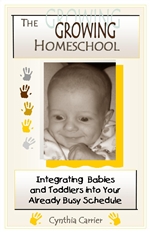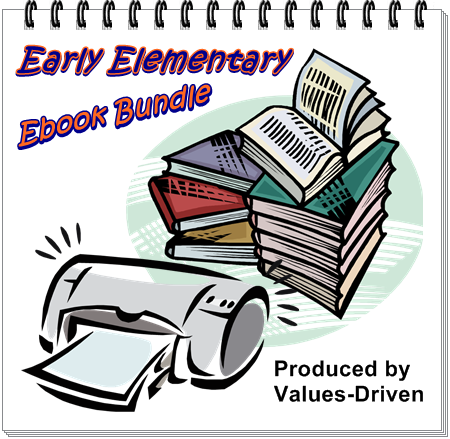Organizing Your Homeschool with Little Ones in Mind by Cynthia Carrier
Maybe, in many ways, you are an “expert” homeschool Mom. You have well-developed academic goals for your children and have chosen a curriculum or method and materials that work well for you. But what happens when you add infants, toddlers, or preschoolers into the mix? Likely you sometimes doubt your ability to adequately nurture the little ones without compromising the educational needs of your older children. Or, you worry that you are neglecting your home management responsibilities, or missing out on the joy of day-to-day life as a family. These few tips were designed to help you through this often-overwhelming phase of the homeschooling journey and give you confidence in your attempts to “do it all.”
First, prioritize. Make sure to put first things first. This is necessary at the heart-level as much as on paper. Priorities will be different for each family, and different tasks have to be juggled on different days, with varying levels of importance--so this is a very fluid process. By way of example, our priorities are as follows: faith, family relationships, discipleship of our children, academic learning, and home management. Not everything needs to be done perfectly every day. The idea is that in the long-haul all your goals will be met. Remember that when you homeschool, it's 24/7/365, not from 8:00 AM to 3:00 PM, Monday through Friday, 180 days a year. Some days it seems that we have to emphasize character-building issues and it may be a temporary frustration not to do so much "schooling," but we catch up quite easily on other days. It's a balance--so set your priorities and keep them in some kind of order, day by day.
Next, develop a good routine. "Schedule," maybe--if it works and doesn't become a hard task-master for you. Routine, DEFINITELY! Everything goes much smoother if everyone knows what to generally expect in the course of each day. Make time for Bible reading and prayer. Fit in chores, school time, free time for the children, some family time, extra-curricular activities (well-considered), and whatever else is on your priority list.
Now, integrate tasks. Consider how multiple objectives can be met concurrently. Some of the things that need "doing": taking care of the baby, keeping the young ones occupied during school time, schooling the older kids, character training, home management and perhaps ministry or service within the community. And of course, it's important to always enjoy just being a family! Some examples of integration: let one of your older children spend some time rocking the baby while they listen to a teaching tape or watch an educational video. Have a daily 30-minute chore time (or two, 30-minute chore times) during which everyone helps in some aspect of home management or food preparation. At the same time, do math drills out loud, Mom can read aloud to the kids while they work, or verbally review what the children have learned in their lessons during the morning or the day before. Let the little ones use the math manipulatives that the older kids are using or scribble on paper while the big kids do their writing. It may be a bit distracting, but it keeps the family unified and lets the little ones feel included--thus, they are often less disruptive.
On a related note, integrate academic subjects as much as possible. Think about how you can kill many birds with one stone in academic learning by doing a Unit Study on a topic of interest. Use your science or history textbook as a springboard for theme-related ideas that you can flesh out with different activities. A quick search online will usually result in many great ideas, no matter what topic you want to cover. One example: One science topic on our list of objectives was to study the human body systems. We read a library book on body systems (SCIENCE), then (for LANGUAGE ARTS), we reviewed how to use a dictionary. The younger children used a simple kids' dictionary and the older used a standard dictionary. Each child looked up different words related to the topic. (For example, the first grader looked up things like "brain," "stomach," and "lungs," while the third grader defined things like "system," "organ," and so on.) They wrote words and definitions, then a short summary of what we had read. To integrate MATH, we compared the interrelated body systems to the interrelation of different mathematical operations (i.e., addition as the opposite of subtraction, and multiplication and division as inverse operations). Integrating social studies in this case was a bit challenging so we simply did some book work at a later time. Integration is great, but it doesn't have to be all-or-none. You can purchase many unit study materials, but a little creativity and an Internet connection sometimes suffices just as well. Also consider how the arts and different subject areas can be integrated just through journaling and "living books," as in the Charlotte Mason approach.
Of great necessity is training your toddlers. Expect and train your younger children to occupy themselves with a single activity for at least 20-30 minutes during school time. Activities in a bag or box are good for this (there are many ideas online, free or for purchase). Help your children enjoy reading by giving them quality picture books and simple stories for an independent "reading time." Remember that even if you invest heavily in the training process on the front end, it will reap great dividends on the back end; don’t put off training in favor of schooling your older children, especially if temporary chaos is the result!
Finally, remember that your little ones are at a stage in life where they need lots of love, guidance, and attention. This time passes all too quickly. So meet the unique needs of your little ones, and everyone will be the better for it. It is important to balance their quiet times with more physical activities. Keep them well-hydrated and offer small, healthy, mid-morning snacks. Fill them up with some "Mommy time" before their independent play period. Finally, don't expect them to tend to a task or activity for much more than 20-30 minutes at a time.
Leverage these few tips from our “growing homeschool” trenches, and you can remain productive in all your homeschooling and home management responsibilities, while also experiencing the everyday joy that God desires for your family.
Copyright © 2007-2011, Cynthia Carrier
The Growing
Homeschool
Early Elementary Ebook Bundle
Cynthia Carrier is the homeschooling mom of eight children and author of several books. She has been a popular speaker at homeschool conventions and other events. The focus of Marc and Cindy's "Values-Driven" ministry is to encourage and equip Christian families to make the most of every opportunity: that is, to serve God, participate in fulfilling the Great Commission, and raise children who love and serve the Lord. For more information about their resources, for fresh inspiration on your family journey, or to find practical helps-including many FREE DOWNLOADS-visit http://www.ValuesDrivenFamily.com.
|
|
|
|
$10 for 12 MP3 audios! |
|
Article Spotlight: Home Management: One-Size-Fits-All
Frugality? << more articles >> |
All content copyright © 2008-2011, Marc and Cynthia Carrier and Values-Driven®.










